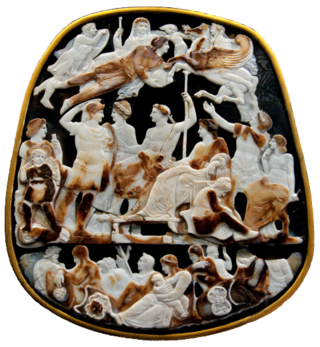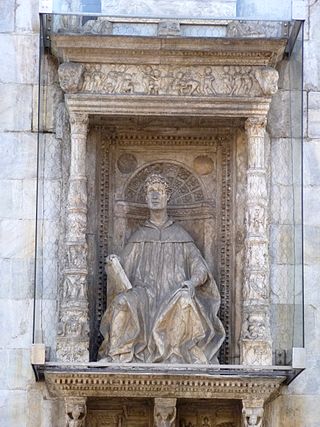
Gnaeus Octavius Titinius Capito (- 1st century, - 2nd century) was a Roman eques, officer, and civil servant active during the first and second century AD.

Gnaeus Octavius Titinius Capito (- 1st century, - 2nd century) was a Roman eques, officer, and civil servant active during the first and second century AD.
A member of the Titinia gens, he served successfully in the army, later becoming secretary ab epistulis under the Emperors Domitian, Nerva and Trajan. [2] [3] He ended his career of civil servant becoming Praefectus vigilum . [2] He was a friend of Pliny the Younger, [3] with whom he kept up a correspondence. [2] We are left with a letter addressed by him to Pliny, where he advised his friend to devote himself to history, and with the answer of Pliny. [2] [4] He also wrote about the deaths of famous men, [3] and was a supporter of literates. [2] Moreover, he honored republican heroes by keeping in his house statues of Cato Uticensis, Brutus, and Cassius [2] [3] bearing elogia written by himself. [5]

The Julio-Claudian dynasty comprised the first five Roman emperors: Augustus, Tiberius, Caligula, Claudius, and Nero.

AD 59 (LIX) was a common year starting on Monday of the Julian calendar. At the time, it was known as the Year of the Consulship of Apronianus and Capito. The denomination AD 59 for this year has been used since the early medieval period, when the Anno Domini calendar era became the prevalent method in Europe for naming years.

Gaius Plinius Secundus, called Pliny the Elder, was a Roman author, naturalist, natural philosopher, and naval and army commander of the early Roman Empire, and a friend of the emperor Vespasian. He wrote the encyclopedic Naturalis Historia, which became an editorial model for encyclopedias. He spent most of his spare time studying, writing, and investigating natural and geographic phenomena in the field.

Gaius Plinius Caecilius Secundus, born Gaius Caecilius or Gaius Caecilius Cilo, better known as Pliny the Younger, was a lawyer, author, and magistrate of Ancient Rome. Pliny's uncle, Pliny the Elder, helped raise and educate him.

Gnaeus Pompeius Magnus was a Roman politician and general from the late Republic.

The gens Pompeia was a plebeian family at ancient Rome, first appearing in history during the second century BC, and frequently occupying the highest offices of the Roman state from then until imperial times. The first of the Pompeii to obtain the consulship was Quintus Pompeius in 141 BC, but by far the most illustrious of the gens was Gnaeus Pompeius, surnamed Magnus, a distinguished general under the dictator Sulla, who became a member of the First Triumvirate, together with Caesar and Crassus. After the death of Crassus, the rivalry between Caesar and Pompeius led to the Civil War, one of the defining events of the final years of the Roman Republic.

The gens Marcia, occasionally written Martia, was one of the oldest and noblest houses at ancient Rome. They claimed descent from the second and fourth Roman Kings, and the first of the Marcii appearing in the history of the Republic would seem to have been patrician; but all of the families of the Marcii known in the later Republic were plebeian. The first to obtain the consulship was Gaius Marcius Rutilus in 357 BC, only a few years after the passage of the lex Licinia Sextia opened this office to the plebeians.
The gens Octavia was a plebeian family at ancient Rome, which was raised to patrician status by Caesar during the first century BC. The first member of the gens to achieve prominence was Gnaeus Octavius Rufus, quaestor circa 230 BC. Over the following two centuries, the Octavii held many of the highest offices of the state; but the most celebrated of the family was Gaius Octavius, the grandnephew and adopted son of Caesar, who was proclaimed Augustus by the senate in 27 BC.
Gaius Ateius Capito was a Roman jurist in the time of emperors Augustus and Tiberius. He was consul suffectus in the year 5 from July to December as the colleague of Gaius Vibius Postumus.

The gens Caecilia was a plebeian family at ancient Rome. Members of this gens are mentioned in history as early as the fifth century BC, but the first of the Caecilii who obtained the consulship was Lucius Caecilius Metellus Denter, in 284 BC. The Caecilii Metelli were one of the most powerful families of the late Republic, from the decades before the First Punic War down to the time of Augustus.
The gens Caelia was a plebeian family at ancient Rome. The nomen Caelius is frequently confounded with Coelius and Caecilius, with some individuals referred to as Caelius in manuscripts, while appearing as Coelius or Coilius on coins. Although the Caelii asserted their great antiquity, none of them attained any of the higher offices of the Roman state until the praetorship of Publius Caelius in 74 BC, and the first of this gens who obtained the consulship was Gaius Caelius Rufus in AD 17. The emperor Balbinus was a descendant of the Caelii.

The gens Munatia was a plebeian family at Rome. Members of this gens are first mentioned during the second century BC, but they did not obtain any of the higher offices of the Roman state until imperial times.
The gens Pacuvia was a minor plebeian family at ancient Rome. Members of this gens are first mentioned during the second century BC, and from then down to the first century of the Empire Pacuvii are occasionally encountered in the historians. The first of the Pacuvii to achieve prominence at Rome, and certainly the most illustrious of the family, was the tragic poet Marcus Pacuvius.
Titus Manlius Torquatus was a politician of the Roman Republic, who became consul in 165 BC. Born into a prominent family, he sought to emulate the legendary severity of his ancestors, notably by forcing his son to commit suicide after he had been accused of corruption. Titus had a long career and was a respected jurist. He was also active in diplomatic affairs; he notably served as ambassador to Egypt in 162 BC in a mission to support the claims of Ptolemy VIII Physcon over Cyprus.
Gnaeus Octavius was a Roman politician and general who served as consul in 165 BC and was the builder of the Porticus Octavia.
The gens Titinia was a minor plebeian family at ancient Rome. Members of this gens are mentioned as early as the time of the decemvirs, but only a few held any magistracies, and none of them ever attained the consulship.
The praefectus vigilum was, starting with the reign of the Emperor Augustus, the commander of the city guards in Rome, whom were responsible for maintaining peace and order at night--a kind of fire and security police. Although less important than the other prefects, the office was considered a first step in order to reach an important position in the imperial administration.
An elogium was an inscription in honour of a deceased person, which was placed on tombs, ancestral images and statues during the Roman age. The elogia are sometimes synonyms with the tituli, the identifying inscriptions on wax images of deceased ancestors that were displayed in the atrium of the domus of noble families, but they are shorter than the laudatio funebris, the funeral oration. Originally, the text was usually written in saturnians, but later it could be in hexameters, iambic hexameters, distichs or in prose. Characteristic of the elogium is the nominative case used for the name of the deceased and not, as it was the case later in the funerary literature, the dative.
Gnaeus Octavius was a politician of the Roman Republic. He was praetor c. 131 BC and consul in 128 BC, but his life is mostly unknown apart from a few inscriptions and an anecdote from Cicero.